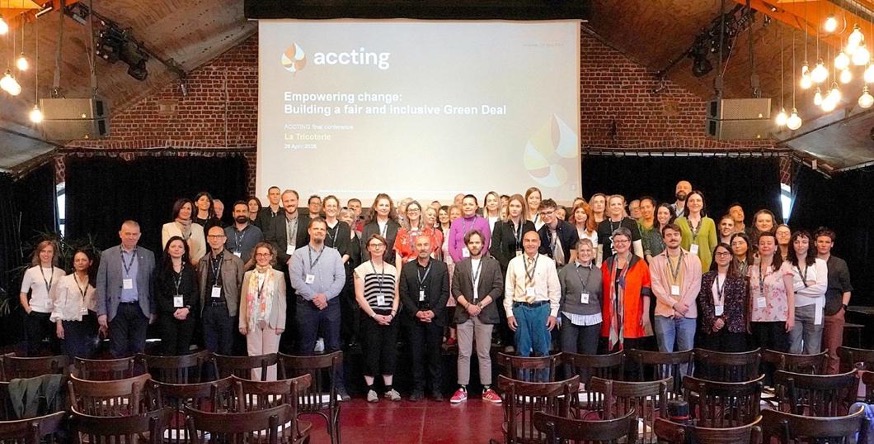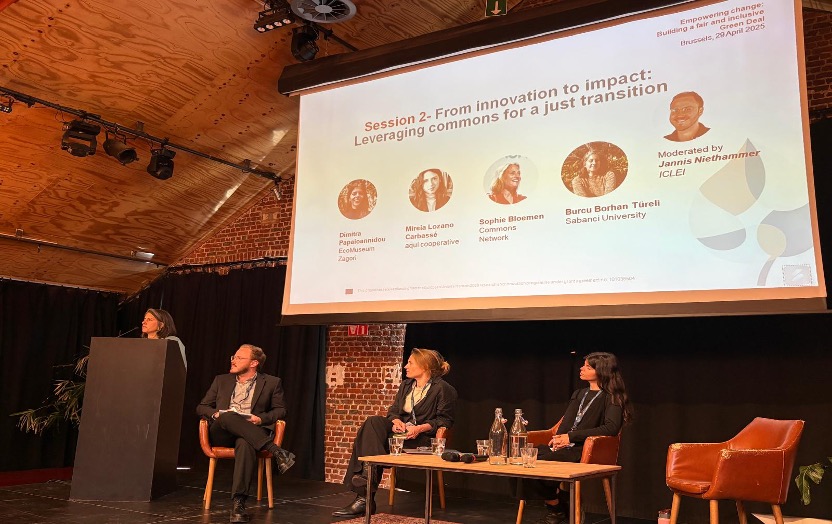We’re often told that our vision for a just transition is utopian, too ambitious, and idealistic. But across Europe, communities are already making a fairer, greener future a reality. In this blog, Burcu and Esin describe how commons-based initiatives are emerging and re-emerging, offering grounded, collective responses to the ecological and social crises we face.
This blog post is co-authored by Burcu Borhan Türeli and Esin Düzel, emerging from the research findings and insights of the ACCTING project.
What if the key to a fairer, greener future lies not in top-down solutions, but in the everyday practices of care, cooperation, and commoning already taking place in communities across Europe? How can the commons contribute to shaping a fair and inclusive European Green Deal?
Drawing on three and a half years of in-depth ACCTING research, this blog post distils some key insights into how commons drive inclusive, justice-oriented climate transition at individual, collective, and organisational levels. Our findings provide timely insights for commoners, civil society, NGOs, policymakers, researchers, and all those working towards climate justice and social equity across Europe and beyond. They underscore the need for policy innovations that support commons-based solutions and highlight inspiring examples already making a difference on the ground. The insights shared in this post were originally presented in the ACCTING’s Final Conference[1] in Brussels to a diverse audience of civil society representatives, NGOs, policymakers, researchers, and Green Deal stakeholders.

Across Europe, commons-based initiatives are emerging—or re-emerging—as collective responses to the multi-layered climate crisis by the marginalised communities. ACCTING documented a wide range of these initiatives, from urban community gardens and food cooperatives to rural energy collectives and bike-sharing schemes. The research shows that these communities are coming together to address shared challenges by revitalising or drawing on traditional commons practices and knowledge.
Whether through participatory energy planning, community-organised disaster response, or neighbourhood-led food distribution networks, people are demonstrating that managing resources collectively is essential for resilience and justice. Through shared governance, participatory decision-making, and practices of collective care, commons offer material access to vital resources, such as food, energy, land, and mobility They also create spaces for marginalized people to raise their voices, co-create solutions, and reclaim agency over their lives.Doing so, they also challenge dominant systems of exclusion and extraction, foster empowerment, and cultivate interdependence.
- Commons and commoning as a way of defending life spaces
Marginalized communities defend their life spaces, the places they call home and that sustain both human and nonhuman life —forests, rivers, farmland, and neighbourhoods—from environmental destruction, climate threats, and abandonment. Where institutions fail, commoners take collective responsibility to safeguard their territories, linking environmental protection with the right to exist.
In rural Turkey, we found that elderly women in forest villages, who are usually not actively included in fire intervention mechanisms, actually play a crucial role in wildfire prevention. Their deep, ancestral knowledge of forests, water sources, and land-use practices—including grazing and controlled burns by nomadic herders—has long served as an effective, sustainable way to reduce wildfire risk. Their collective care practices intersect with fire prevention, yet remain largely unacknowledged.
Commons often arise where institutional support is lacking. During the Ljusdal forest fires in Sweden, local residents self-organised via Facebook, mobilised volunteers and resources to protect the area. In Italy, floods led to the formation of citizens’ committees to self-educate, monitor local waterways, maintain green spaces, and advocate for stronger protections. These initiatives often expand from disaster prevention to resisting extractivist projects and establish long-term solidarity. Their deep connection to their life spaces keep them vibrant and empowered.
- Commons act with climate justice movements
In many cases, solidarity actions nurtured in the commons gradually transform into national or even international social movements, expanded fields of struggle where social and climate justice intersect.
A powerful example is the Akbelen Forest struggle in Turkey, where small farmers, forest villagers, and environmental activists united against coal mines. They established a forest watch site, where ecology activists across the country stayed together with the locals. This long-term, solidarity-based protest, rooted in connection with the forest, merged social and climate justice issues. In their struggle against a planned limestone quarry near a UNESCO site, Bulgarian villagers emphasized the quarry’s potential impacts as pollution, water shortages and other impacts on their livelihoods that depended on subsistence farming and local tourism.
- Commons enliven archives of ecological wisdom
Commons connect past knowledge with present needs to shape resilient, place-based responses to climate crises. Elderly locals and women in Romanian rural areas, as well as the pastoral nomadic group Sarıkeçililer in Turkey, for example, pass on knowledge of small-scale farming, animal grazing, nomadic lifestyle,and livestock care to younger generations. Their deep knowledge of seasonal cycles, water resources, and animal behaviour helps maintain a sustainable ecological balance with nature.
In the Bela Flor Respira project in Portugal, low-income individuals, elderly people, immigrants, and women collectively transform a degraded space in central Lisbon into an agroforestry area, where different age groups learn from one another.
- Commons involves co-learning and building knowledge together.
Several commons cultivate collective agency and resilience through safe, co-learning spaces, where individuals share resources and build knowledge together. For example, in Sweden, the “Prepping Together” initiative shifts crisis preparedness from an individual responsibility to a community effort through local study circles, where people share their experiences and learn from one another, guided by local leaders. Similarly, in Portugal, the Natura Observa project pairs volunteers of varying experience in habitat restoration and species monitoring, promoting hands-on learning and exchange.
Safer bike routes turn streets into commons, enabling connection and agency. “School op de Teller” initiative in Belgium identifies issues using local traffic data and children’s input to redesign their school’s environment. Communal bike repair shops, such as Bike Kitchens in Italy and Portugal, bring people together to repair bicycles using recycled parts and donations. “CICLOPES” project in Lisbon offers free repairs and bikes to those in need, making mobility more accessible.
Research indicates that participation in community energy commons promotes collective learning, sustainable practices, and enhanced energy literacy. In Italy’s “A Otto Minuti dal Sole” initiative, participants learn how to read energy bills, reduce costs, and adopt energy-saving behaviours. In Calabria, the Renewable and Solidarity Energy Community has established a local energy grid that powers schools with renewable energy and shares surplus electricity with 30 social housing households.
- Commons promote democratic participation and support self-organisation tools
Commons support diversity of grassroot mobilization models, such as citizen panels, assemblies, protests, and petitions. Although reaching consensus on shared goals or formulating joint proposals can be challenging, the research emphasises that commons can help articulate collective demands more effectively for a substantive dialogue with policymakers.
The ACCTING-funded “Commoning Cycling” project by Aquí in Barcelona brings together diverse groups—cycling activists, climate action groups, feminist collectives, and policymakers—forming an inclusive coordination group of over fifteen members. The project fosters collaborative problem-solving to remove barriers to accessible cycling, especially for women. In Boavista, Portugal, community associations facilitate democratic participation through popular referendums and have driven policy changes.
- Collectively reclaiming a space enables the reconstruction of shared values, social relations, and a grounded notion of collective rights
Commons counter market logic of privatization, enclosure and commodification. Instead, they foster a culture that views access to commons such as land, energy, food, and mobility as collective rights, central to the climate justice movement.
In Thessaloniki, Greece, Pervolarides reframe food from a commodity into a tool for solidarity through their social kitchens and food waste and sovereignty workshops. In Kadifekale, Izmir, the municipality-led urban garden not only enhances access to healthy food but also empowers women through needs-based and rights-focused workshops and tightly knit community. “Terras de Cascais” in Cascais, Portugal is another strong example of a municipality-led initiative.
Grassroots food initiatives, such as ASFM and Ny Gemenskap in Sweden, utilise rescued food to address food insecurity and reduce waste. These communal efforts revolve around collective care, mutual aid, and volunteer-led food distribution to vulnerable populations, showing how everyday commoning builds resilience and social support. The “Garden of Encounter” in Austria, initiated by a local NGO, enables refugees and immigrants to grow culturally familiar food, supporting integration and self-sufficiency.
To read more on our policy recommendations on commons, you can check out the following fact sheets we co-authored in ACCTING — “Valuing indigenous and local knowledge in disaster management and nature protection,”“Promoting Policy Innovations That Promote Commons”, and “Commons For All.”
Commoning is building a sustainable and just life here and now. Genuinely empowered and given responsibility, especially in marginalised communities, commoners are keen to protect their life spaces. They defend a forest, grow food, and bring local knowledge, cultural insights, and practical experience to the transition process. Commons-based transitions foster a sense of ownership and belonging. To ensure a just transition towards sustainable futures, we need to learn more from and support the commons.


[1] A full replay of this session—including the insightful presentation by Sophie Bloemen of Commons Network—is available at accting.eu/accting-final-conference-replay-now. Replays of the other sessions are also accessible on the same page.
 ☰
☰